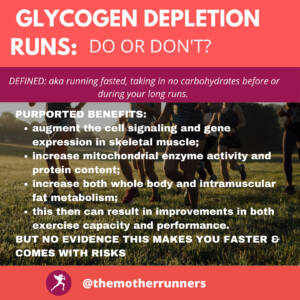Runners are always trying to gain a competitive edge—especially marathoners. And a major way to do that is with fueling—tinkering with how many carbohydrates you take in for optimal energy efficiency. Some train high, focusing on gut training, and some train low with glycogen depletion runs.
Glycogen depletion runs or running fasted means you take in no carbohydrates before or during your long runs.
Related: The Scientific Benefits of Long Runs
The theory is that low-glycogen training will teach your body to use its near endless amount of fat to fuel your running rather than your limited glycogen supply (which lasts for only about 90-120 minutes of running). This will allow you to avoid bonking or hitting the wall in your marathon or long-distance race. (People call this being “fat adapted.”)

Related: How to Recover from Hitting the Wall in Your Marathon
Pro runners such as Meb Keflezighi and ultrarunners such as ultra-marathon great Dean Karnazes have touted the benefits of running fasted and being fat adapted.
The controversy of running carb depleted
However, running or working out carb depleted comes with risks—especially for women. And, the body is complicated. Unfortunately, it’s not as simple as switching up fuel sources.
I want to clear things up because even though running carb-depleted has been around for about a dozen years, there are still a lot of conflicting opinions and information about it. And, I will say that while there are a lot of anecdotal carb-depleted training success stories, there is no sound science to support its efficacy. It is highly individual.
In this article, I dig into the research and connect with registered sports dietitian Megan Robinson to give you the details on glycogen depletion runs and if you should consider them in your training.
Specifically, I will answer:
- What is a glycogen depletion run?
- How do you do a glycogen depletion run?
- What are the purported benefits of glycogen depletion workouts?
- What are the risks of running fasted? What does the research find?
- And, finally, I share who should try carb depletion runs.
Ok, let’s get going!
Related: Why You Should Intermittent Fast and Exercise
What is a glycogen depletion run?

A glycogen depletion run is when you run either after a 10-14 hour overnight fast or not consuming carbohydrates after an initial high-intensity morning run and run the second afternoon workout (low intensity) on low muscle glycogen stores.
Your body burns carbs for energy to fuel your running. When you run with less readily available stored carbs, or glycogen, your body will tap into the not-as-easily-accessible fat for fuel.
The goal of a glycogen depletion run is to train your body to primarily use fat for energy while running. The hope is that this can help you avoid hitting the wall in the marathon. It is hoped that this can lead to fat loss.
Related: Gut Training to Nail Your Marathon
How do you do a glycogen depletion run?
Runners who do glycogen depletion runs or run in a depleted state most often do them in the morning after sleeping, skipping breakfast. The run is done at a very easy pace since your body cannot quickly and easily convert fat to fuel.
This approach to carb periodization has been termed “train-low, compete-high”, explains Robinson. This model promotes carefully scheduled periods of carb-restricted training for augmenting adaptation but ensures high carb availability prior to and during competition to promote maximal performance.
Related: How to Safely Run to Lose Weight
Below are some general guidelines for glycogen depletion runs.
9 Tips to Do Glycogen Depletion Runs
- Eat a low-carb dinner. The night before a glycogen depletion run, eat a low-carb dinner. Skip any bedtime snacks and fast for at least 10 hours.
- Run in the morning. Run in a fasted state in the morning. Do not eat breakfast. Use creamer in your coffee that has no carbs. You can drink water or water with electrolytes (no carbs).
- Run slow. If you train low, you need to run slow. Pace needs to be no faster than 65 percent of your max HR to utilize fat for energy, says Robinson. If you run faster, muscle glycogen depletion occurs faster and performance suffers, she warns.
- Run long…but not too long. Aim to do your run for 90-120 minutes or less. Longer than this risks injury, overtraining, and hormonal imbalances. Start with a shorter time or distance like an hour and gradually increase.
- Refuel. When you’re done with your run REFUEL with carbs and protein, and some healthy fats.
- Use sparingly. Those who tout depleted state runs recommend doing them sparingly. There are many numbers out there and it’s very individual what fraction is best for you. Some coaches recommend once a month on an easy long run. Some recommend two, such as Matt Fitzgerald in his latest book Run Like a Pro. Others recommend, no more than 20 percent of your weekly mileage while in base phase.
- Do it in base phase. Aim to do these runs when your intensity is low and you are running mostly just easy mileage in your base training phase. I advise you to not attempt this strategy unless under the guidance of a registered dietitian.
- Avoid carb depletion in taper phase. There are some athletes who will deplete their carbohydrates prior to carbo-loading for their marathon taper. This comes with inherent risks as carb-depleted training puts more stress on the body,
making you more at risk of illness and injury. I advise you to not attempt this strategy unless under the guidance of a registered dietitian. Depleting carbs prior to carb loading does not show to be effective to maximize muscle glycogen stores before race day. - Think twice if you are female. Most of you reading this are likely female. Note that the research conducted on any benefits of glycogen depletion runs used mostly male subjects. Females running fasted increases stress hormone, cortisol, which adds additional stress to the body and promotes fat storage, not burning.
Related: Marathon Fueling 101: What Runners Should Eat
Does running fasted make you faster?
The purported benefit of glycogen depletion runs is that it will give you a competitive edge in your long-distance running allowing you to run fast for longer.
“Training periodically with low muscle glycogen stores can activate genes to maximize our endurance,” explains Robinson. But this does not translate to running faster, it just may allow you to run longer with less fatigue.
Related: How to Carbo-load for Your Marathon or Half Marathon
The science behind glycogen depletion runs
How? Oxidizing or “burning” fat in our muscles during exercise rather than using exogenous carbs (eaten before or during training) allows us to use fat primarily as a fuel, increasing fat-burning enzymes and endurance, explains Robinson.
The enzyme, AMPK, measures the energy status in our cells. When we fast while exercising, AMPK is activated. This activation turns on a process that increases energy production (fat burning, and glucose uptake) and decreases energy use. Activating this process allows us to train at a high intensity sparing muscle glycogen longer since higher-intensity exercise increases AMPK more than low-intensity exercise.
However, research has not found this to translate into better performances. Other research has shown this method to be potentially beneficial for lay people but not trained athletes.
Furthermore, training low increases mitochondrial biogenesis, meaning it increases the size and number of mitochondria. This allows our muscles to work more efficiently aerobically and improve endurance capacity.
Bear in mind that this is a process that happens anyway when you run.

Related: How to Choose the Right Energy Gel for YOU
What are the purported benefits of glycogen depletion runs?
Specifically, restricting carbs before, during, and in recovery from endurance-based running can:
- augment the cell signaling and gene expression in skeletal muscle;
- increase mitochondrial enzyme activity and protein content;
- increase both whole body and intramuscular fat metabolism;
- this then can result in improvements in both exercise capacity and performance.
Again, this has not necessarily translated to faster race times.
What are the potential risks of running fasted?
This all sounds very convincing to sometimes forgo breakfast before your runs.
But it’s important to note that running your long runs in a glycogen-depleted state comes with risks:
- No guaranteed performance improvement. Research is limited on the benefits of glycogen depletion runs. There are no studies that show these glycogen-depleted runs improve running performance.
- Not suitable for female athletes. Research has not been conducted on female athletes. Most research has been conducted on small groups of male cyclists. Dr. Stacy Sims that regularly exercising fasted can disrupts your hormone levels and lead to weight gain, among other issues. Read more details on those potential risks in my intermittent fasting and exercise article.
- Overtraining and injury-risk. Some research indicates a connection between glycogen depletion training and overtraining syndrome and injuries.
- Increased risk of illness. Training low puts added stress on your body, compromising your immune system. Therefore, there is an increased risk of illness as well if you regularly run fasted.
Should I try running fasted?

Despite the evidence or lack thereof, you may still be interested in training fasted. There are plenty of people who swear by it. And there are plenty of people who just don’t like to eat before running because it messes with their stomachs.
In most cases, as a coach, I do not think the risks are worth the potential rewards and try to help my athletes nail their fueling strategy using gut training. In my humble opinion, optimizing your training, fueling, and recovery will bring more performance and fitness benefits than restricting your carb intake.
However, if you are interested in working out at a fasted state, I advise checking these boxes first:
- You have been healthy with no illness or injury for at least 6 months (e.g. as a mom, you don’t have small kids around you with their germs!)
- You eat a healthy diet and fuel yourself well.
- You are in tune with your body and how it feels.
- You know your true easy run pace.
- You get enough sleep most nights.
- You’re in the base phase of your training cycle.
- You’ve had tummy issues while training or regularly hit the wall in your marathon.
I know several people who regularly exercise fasted or swear that running fasted has helped them avoid bonking. If you are someone who hates eating before their runs, or has really struggled with finding a marathon fueling strategy that works for you, then trying carb depletion runs could be the right fit for you.
Runners need to see what works best for them to avoid bonking and feeling strong on their runs!
If you want guidance with your training while running pregnant or postpartum, check out my run coaching services. Also, be sure to check out my free training plans:
- Postpartum Training Plan
- After a Break Training Plan
- 5k Training Plans
- 10k Training Plans
- Half Marathon Training Plans
- Marathon Training Plans
- Strength Training Plan
